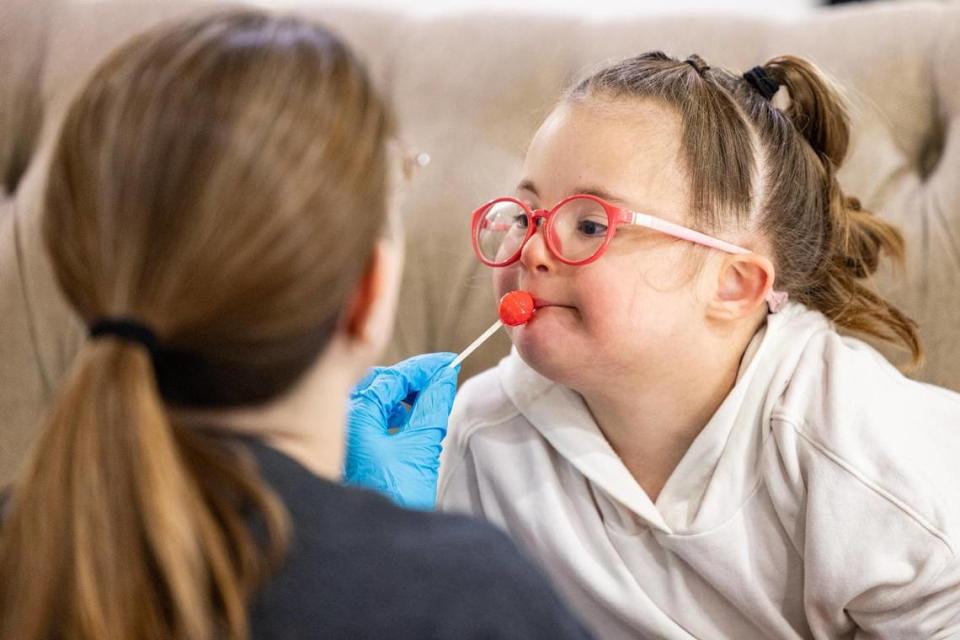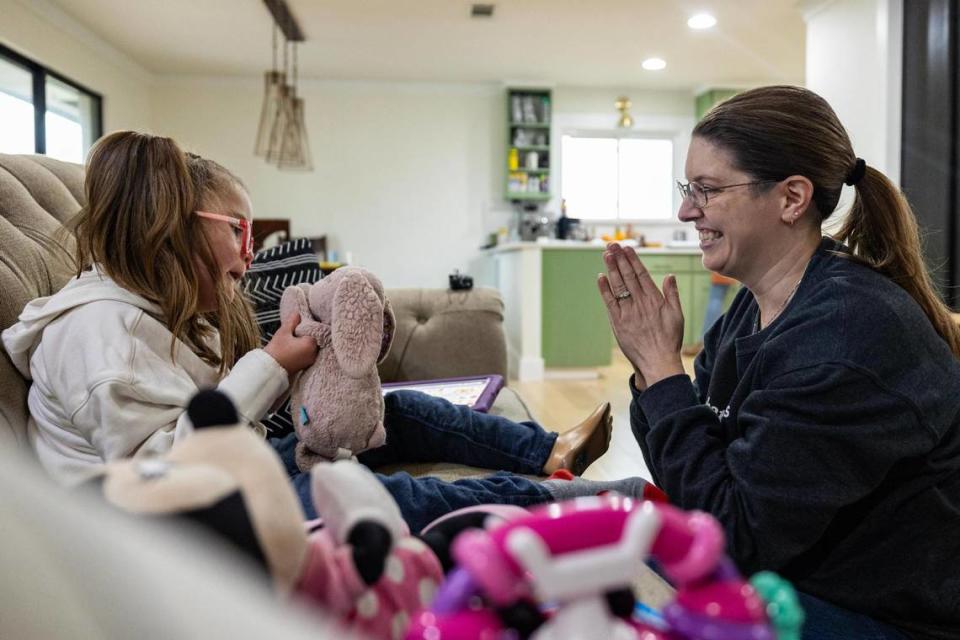A Texas insurance company tried to cut reimbursement for treatment. Here’s why it lost
Nora Cerda purses her lips together, getting ready to kiss a strawberry lollipop.
After 10 kisses, she gets a break to savor the treat.
Nora, 7, is finishing a session of speech therapy with her speech language pathologist, Leanna Vollintine.

These twice-weekly sessions at the family’s home in Weatherford are essential for Nora, who was diagnosed with both Down syndrome and Moebius syndrome as an infant. Both diagnoses have caused muscle weakness and nerve innervation in her face and tongue, making it harder for Nora to speak, chew and swallow food. Her string of exercises with the lollipop helps her to strengthen those muscles. Kissing the lollipop, in particular, helps her practice closing her mouth, Vollintine said.
A few months ago, the Cerdas weren’t sure that Nora would be able to keep working with Vollintine. Their insurance provider, Blue Cross and Blue Shield of Texas, had announced plans to cut the reimbursement rates for speech therapy by 12% in 2024, meaning Vollintine would get paid less than she had in years prior if she continued to work with Nora.
Dozens of independent speech pathologists across the state pushed back against the decision, arguing that their reimbursement rates had stayed stagnant for years, and a cut to those rates would force many to leave the insurance company’s network. SLPs, as they are known, sent emails, left voicemails, and commented on Facebook to urge the company to change its mind.

And then, something unusual happened: The insurance giant reversed its decision, agreeing to keep its reimbursement rate for 2024 the same as the year prior, according to multiple speech language pathologists. Blue Cross insures more Texans than any other providers in the state,
A spokesperson for Blue Cross and Blue Shield of Texas did not answer questions from the Star-Telegram. In a statement, an unnamed spokesperson said: “We continuously assess our reimbursement policies to ensure they align with industry standards, market factors, evolving health care landscape, and clinical quality of services performed. We value input from members and our providers — having been in Texas 95 years — so that we can continue to expand access to quality, affordable health care for Texans.”
The insurance company did not directly tell any independent speech pathologists that their advocacy campaign caused them to reverse course. But pathologists like Vollintine and families like the Cerdas consider it a rare victory in a system that they say has made it difficult for children like Nora to access the care they need.
How health insurance negotiations typically work
The recent battle over reimbursement rates for speech therapy in Texas stems from one of the basics of U.S. health care: There is no fixed price for most medical or therapeutic treatments.
Private health insurers, like Blue Cross and Blue Shield, determine how much they will pay for a certain treatment, like 30 minutes of speech therapy, through a negotiation with the provider. But increasingly, insurance companies and health care providers have consolidated, meaning those negotiations are like “sumo wrestling,” said Cynthia Cox, an expert on health care costs and insurance with KFF, a health policy research group.
“It’s become a situation where it’s large hospital systems going up against large insurers,” Cox said.

This system, however, means independent providers sometimes have less negotiating power with insurance companies than the big hospitals or health systems in their region.
Vollintine, who provides speech therapy for kids and young adults in North Texas, said the Blue Cross Blue Shield’s decision to keep rates flat is a relief, and means she’ll be able to keep seeing patients like Nora.
But she said the debate over reimbursement rates also indicates that, to her, insurance companies don’t understand how services like speech therapy actually function in people’s lives.


